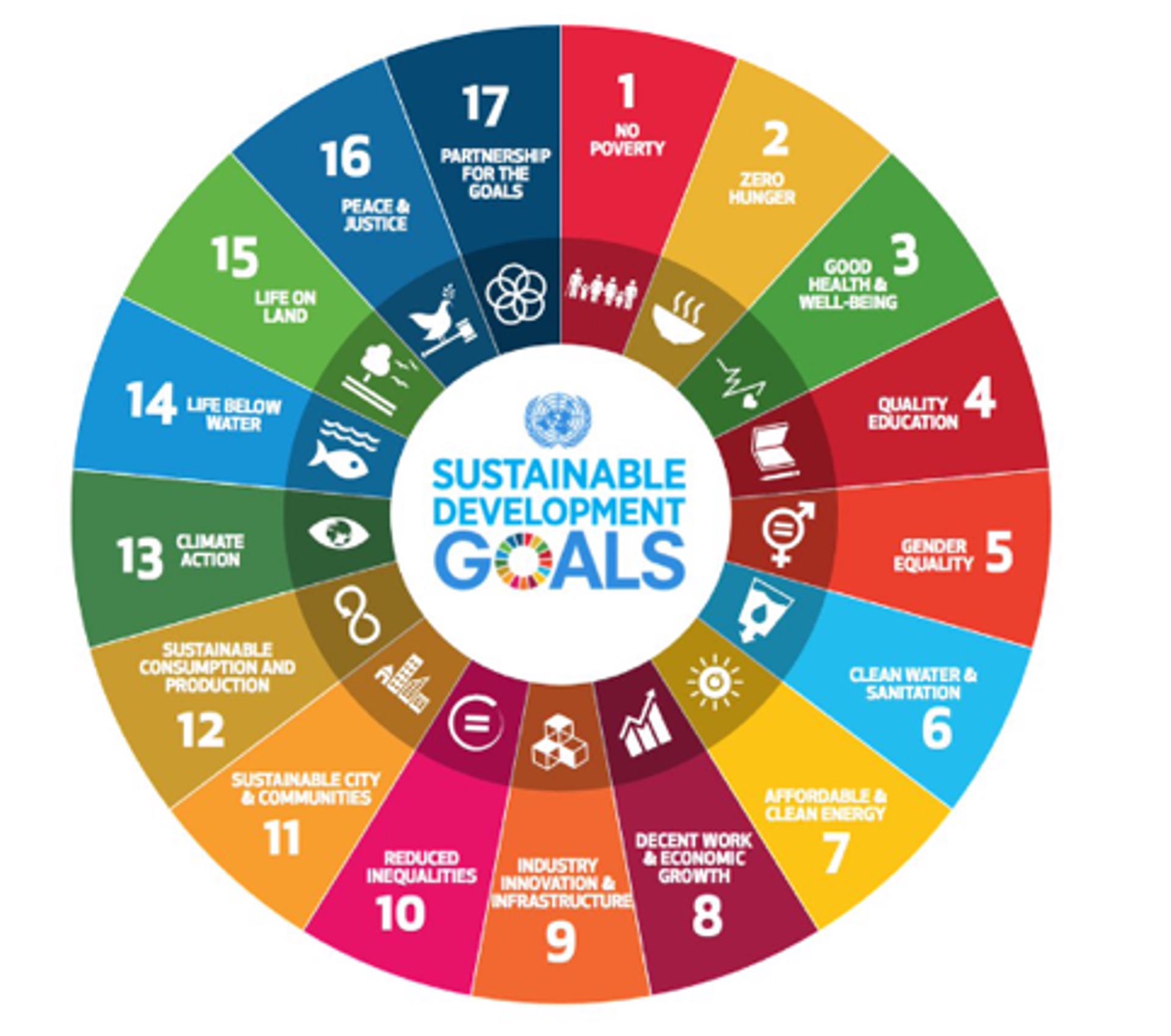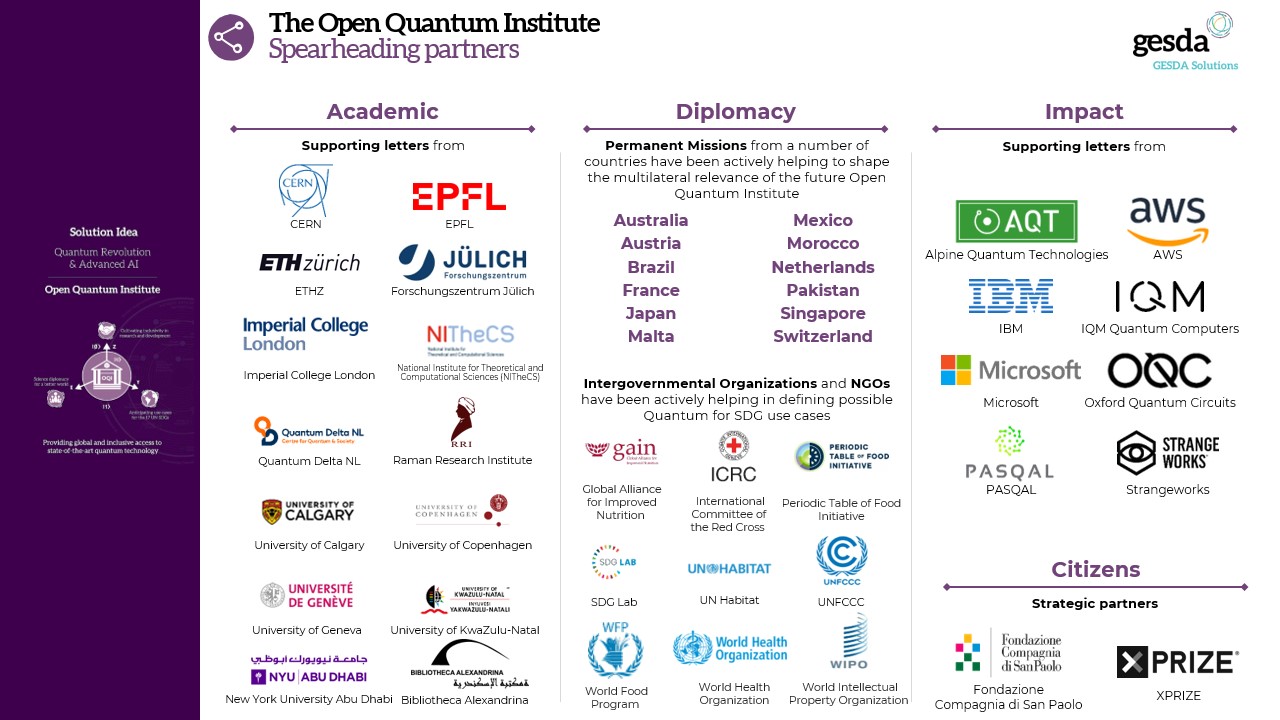
Solution idea:
The Open Quantum Institute
1. What would the Open Quantum Institute do?
Develop quantum for SDG USE CASES:
Becoming the center of expertise for quantum use cases benefitting the SDGs and other applications for humanity.
See here the Report of GESDA’s preliminary exploratory work on quantum for SDG use cases done in collaboration with the SDG Lab.
Provide global ACCESS to state-of-the-art technology:
Facilitating access to a pool of existing quantum computing and education resources.
Ensure INCLUSIVITY:
Opening access to quantum computing research and development to the most diverse groups and geographies to best address the challenges and contribute to the coming of age of the technologies.
IT WOULD NOT
- Conduct R&D directly
- Build quantum hardware
- Provide funding
Read the Open Quantum Institute Story
2. How would the Open Quantum Institute be organised?
Build relevant USE CASES:
Bringing quantum experts, SDG experts and local innovators together to jointly develop relevant applications responding to a need or challenge where quantum computing can actually make a difference.
Involve DIPLOMACY at an early stage:
Raising awareness to enable governments and International Organizations to reflect on the framework conditions to ensure quantum technologies benefit humanity.
Provide a comprehensive EDUCATION portfolio:
Bringing together a three-tier offer to build awareness, support application requests, and assist projects for maximum impact.
Prepare all parties through a global CONTEST:
Launching a GESDA-XPRIZE Quantum for SDG Contest to globally crowdsource use case ideas, raise awareness, create field data and a track record to fine-tune the Open Quantum Institute and its business model.
Working towards the SDGs

The OQI approach is to focus on the needs of the organizations focusing on global challenges and to build the bridge with the quantum experts to study potential quantum computing applications for research.
Initial workshops bringing the two communities together have led to the selection of five potential case studies.
The selection was made taking into consideration:
- The expected computational nature of the challenge
- The likelihood that quantum computers can provide an advantage in solving the identified problem
- The availability of resources to further articulate the use case
- The relevance of the use case to accelerate the achievement of the SDG
The case studies are:
- Case study 1: New Carbon Capture Materials
- Case study 2: Tackling Antibiotics in Wastewater
- Case study 3: Eco-friendly Fertilizer Production
- Case study 4: Sustainable and Nutritious Food Production
- Case study 5: Optimizing Vaccine Distribution
The OQI will work in parallel with the diplomacy community on the non-technological conditions necessary to deploy quantum solutions at scale.
Learn more about the SDG use case
3. How did we get there?
The shaping and development of the Open Quantum Institute is the result of a rigorous process – GESDA’s Anticipatory Situation Room methodology – designed to anticipate and react to future scientific developments that could have significant global impact.

Consultation with GESDA’s diplomatic and scientific fora highlighted quantum computing as a field that will have a transformative effect on people, society, and the planet in the coming decades, and thus requires a science and diplomacy action.
By anticipating the impacts of emerging technologies and creating a common understanding of what needs to be done to support their developments while framing them with purpose, the multistakeholder discussions are able to focus on concrete outputs.
To manage this process, GESDA set up an anticipatory Task Force representing the different interested parties from the public and private sectors, responsible to evaluate the opportunities and gaps and propose potential solutions.
The result is the proposal of an “Open Quantum Institute”. The Task Force is now finalizing its evaluation by broadening the consultations with possible future users and partners. Once evaluated positively, the Open Quantum Institute will enter GESDA’s final phase of development where it will be incubated and tested with coalitions of public and private partners who will be part of the future institute.
4. Who is involved?
The Task Forces responsible for designing and evaluating solution ideas are co-chaired by science and diplomacy leaders from GESDA’s fora who bring together global experts as needed. The Task Force evaluates the solution idea inviting as many contributors as necessary to make sure it is relevant, impactful and feasible. See list below.
Spearheading entities helping GESDA with the first steps of the OQI development:

| Task Force Co-Chairs |
| Academic co-chair: Matthias Troyer, Technical Fellow and Corporate Vice President, Microsoft |
| Diplomacy co-chair: Anousheh Ansari, CEO, XPRIZE Foundation |
| GESDA Solution contributors |
| Amir Banifatemi, Executive Director, XPRIZE Europe |
| Jean-Charles Cabelguen, VP Innovation, Pasqal |
| Vincenzo Chiochia, Director, Deloitte Consulting in the Analytics and Information Management practice |
| Alberto Di Meglio, Coordinator CERN Quantum Technology Initiative, CERN |
| Alexandre Fasel, Ambassador, Swiss Special Representative for Science Diplomacy, Swiss Federal Department of Foreign Affairs (FDFA) |
| Jay Gambetta, IBM Fellow and Vice President, IBM Quantum |
| Nicolas Gisin, Professor, Group of Applied Physics, University of Geneva |
| Markus Herrmann, member of the Board of foraus, co-founderand Managing Director of the China Macro Group |
| Jack Hidary, Research scientist focusing on AI and on quantum computing, Alphabet’s X, formerly Google X |
| Georges Kotrotsios, Vice President, Strategic Relations, CSEM |
| Catherine Lefebvre, Vice President Strategic Business Development North America, PASQAL (& GESDA’s core Team member for Quantum Initiative) |
| Jim Mainard, CTO & VP Deep Technologies, XPRIZE Foundation |
| Deborah Nas, Co-Founder Living Lab Quantum & Society, Quantum Delta NL & Professor of Strategic Design for Technology-based innovation, TU Delft |
| Sarah O’Hare O’Neal, Partner, Associate General Counsel, Global Trade, Microsoft |
| Francesco Petruccione, Professor of Theoretical Physics, University of KwaZulu-Natal (UKZN), Durban (South Africa) |
| Enrica Maria Porcari, Head of IT Department, CERN |
| Kelly Richdale, Senior Advisor, Sandbox Quantum |
| Ambassador François Rivasseau, Chair of the Coordination Committee of the World Intellectual Property Organization, WIPO |
| Barry Sanders, Director, Institute for Quantum Science and Technology, Calgary University |
| Urbasi Sinha , Professor, Quantum Information and Computing Lab, Light and Matter Physics group, Raman Research Institute (India) |
| Mathias Soeken, Senior Software Engineer, Microsoft |
| Ulrike Till, Director of the IP and Frontier Technologies Division, WIPO |
| Rüdiger Urbanke, Professor for Communication Theory, EPFL, Academic Co-Chair of GESDA Solution on Co-development, access & use of advanced AI |
| André Xuereb, Ambassador for Digital Affairs, Ministry for Foreign and European Affairs, Malta |

